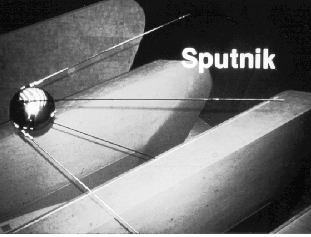Astronomy Picture of the Day
Discover the cosmos! Each day a different image or photograph of our
fascinating universe is featured, along with a brief explanation written by
a professional astronomer.
February 11, 1996

Sputnik: The Traveling Companion
Credit: MSFC Historical Archives
Explanation:
Sputnik means "traveling companion". In stark contrast to this innocent
sounding name, the launch of the Earth's first "artificial moon",
Sputnik 1, by the Soviets on October 4, 1957
shocked the free world, setting in motion events which
resulted in the creation of NASA and
the race to the Moon.
Sputnik I was a 184 pound, 22 inch diameter sphere with four whip antennas
connected to battery powered transmitters. The transmitters broadcast
a continuous "beeping" signal to an
astounded earthbound audience for 23 days.
A short month later, on November 3, the Soviets followed this success by
launching a dog into orbit aboard Sputnik 2.
Tomorrow's picture: Pluto Not Yet Explored
<
Archive
| Index
| Search
| Calendar
| Glossary
| Education
| About APOD
>
Authors & editors:
Robert Nemiroff
(MTU) &
Jerry
Bonnell (USRA)
NASA Technical Rep.:
Jay Norris.
Specific rights apply.
A service of:
LHEA
at
NASA/
GSFC
&:
Michigan Tech. U.
